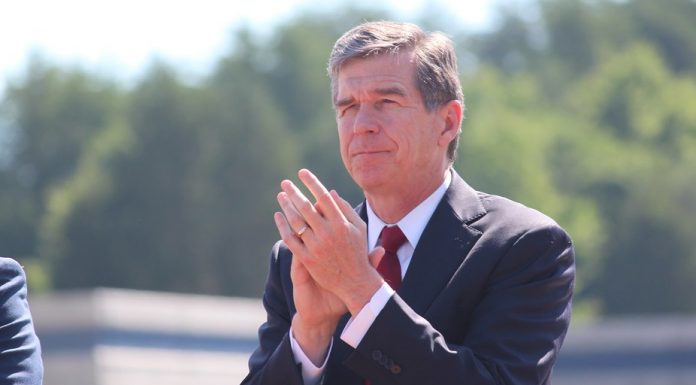(David Bass, Carolina Journal) North Carolina Gov. Roy Cooper is leading a nationwide effort in cooperation with Michigan Gov. Gretchen Whitmer to encourage business leaders to publicly oppose states that pass election-reform laws.
“We are asking the business leaders in our states, and throughout the country, to add their voices to the growing chorus of corporations standing on the right side of history,” the letter states. “When the foundation of our democracy — the freedom of citizens in our states to cast their ballots — is under attack, it is powerful and important when Americans speak up, especially those in leadership positions.”
Cooper and Whitmer, both Democrats, co-sponsored the letter along with former Republican governors Arne Carlson of Minnesota, Bill Weld of Massachusetts, and Christine Todd Whitman of New Jersey.
No sitting Republican elected official signed the letter.
N.C. Republican lawmakers and good-government advocates were quick to denounce the step by Cooper.
“Bullying businesses to oppose policies like voter ID, which North Carolinians amended their constitution to require, is wrong,” said Sen. Warren Daniel, R-Avery. “Politicizing everything in society is divisive and the governor should be ashamed of himself.”
“Cooper and his colleagues feel the need to enlist corporate elites to their cause because they know that regular citizens support commonsense election security measures like voter ID,” noted Dr. Andy Jackson, director of the Civitas Center for Public Integrity at the John Locke Foundation. “They are not interested in engaging in serious debate over election security issues.”
Election integrity has become a national issue after accusations of voting irregularities stemming from the 2020 election.
A flashpoint was a recent Georgia bill — passed by Republicans and signed into law by Republican Gov. Brian Kemp — that makes a number of updates to that state’s election law. The changes have since drawn the ire of the political left, which has encouraged businesses to boycott the state.
Major League Baseball pulled the All Star Game in response — opting to move the game from a black-majority city of Atlanta to Denver, with around a 10% black population. Georgia-headquartered companies Coca-Cola and Delta have criticized the new law, as well.
But Republicans have also pushed back, with some suggesting the baseball’s antitrust status be revoked. U.S. Senate Minority Leader Mitch McConnell, R-Kentucky, accused corporations of acting like a “woke parallel government” and threatened “serious consequences” for companies that retaliate against red states.
In North Carolina, Republican lawmakers are advancing a pair of measures — Senate Bill 360 and Senate Bill 326 — designed to shore up voting integrity.
S.B. 360 would require the state attorney general’s office to get sign-off from the legislature before reaching a settlement on a lawsuit in which the General Assembly is a party. The bill is meant to resolve the type of situation that evolved in 2020 with actions taken by N.C. State Board of Elections Director Karen Brinson Bell.
It would make four key changes to N.C. election law. The first would revise the deadline for absentee ballots to be received by local boards of election from three days after the election to end-of-business on Election Day itself. This change would return state law to where it stood in 2009 and match 32 other states with the same deadline of Election Day.
Additionally, the bill would bar county boards of elections from accepting private donations to administer election services. This move would outlaw scenarios like the one that unfolded in 2020 involving donated funds from the Center for Tech and Civic Life, funded by Facebook founder Marc Zuckerberg and his wife. The CTCL donated so-called “Zuck bucks” to county boards of elections in 33 N.C. counties that ultimately ended up skewing Democratic in voting, compared to the 67 counties that received no money.
S.B. 326 would also expand the timeline for requesting an absentee ballot from seven days before Election Day to 14 days, in line with recommendations from the U.S. Post Office of 15 days.
A fourth provision in the bill would allocate money to create a “mobile voter ID unit” to help people get an ID.
“Poll after poll shows us that North Carolinians want free, fair, and secure elections,” said Sen. Paul Newton, R-Cabarrus. “The policies we are promoting balance all three interests in a thoughtful, reasonable, and effective way. Election integrity has strong support across political ideologies. In no way does S.B. 326 restrict voting access. Our business community should not be intimidated by unfounded narratives. I trust our business leaders to judge our election bills based upon the substance of those bills.”…Original Source…

